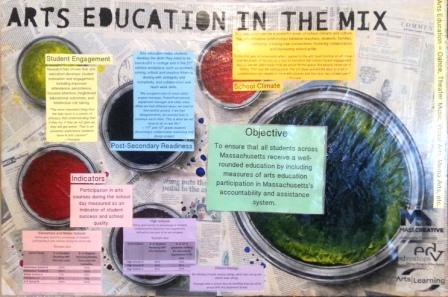
by Emily Bozentka
It may not surprise you to hear that when budget cuts hit schools, arts education is often the first to go. That No Child Left Behind’s (NCLB) focus on math and English Language Arts (ELA) test scores negatively impacted students’ access to courses in the arts, especially for students of color and low-income students. And, that NCLB was designed to narrow achievement gaps, but, in fact, it created opportunity gaps that research has since shown have as much impact on achievement gaps as other academic factors.
Fortunately, the Every Student Succeeds Act (ESSA) that was signed into law last December provides opportunities for states to address these inequities. ESSA rewrites the definition of a well-rounded education to include the arts, and gives states increased flexibility in designing accountability measures. Although math and ELA test scores must receive the most weight under the new legislation, ESSA calls for at least one indicator of student success. This is an opportunity, as we see it, to include arts education in the mix.
Recently, EdVestors, along with partners MASSCreative, Arts|Learning, and the Boston Public Schools, teamed up to participate in The Rennie Center for Education Research and Policy’s event, Shaping the Future of Accountability. Along with eight other groups, we were invited to present a poster outlining our vision of what Massachusetts’ accountability and assistance system should look like to Education Commissioner Mitchell Chester and other education leaders from across the state. Here is our poster and our position:
Arts education affords many benefits to students and schools, including increased student engagement, improved school climate, and access to post-secondary readiness skills. Yet, disparities in access exist along socioeconomic and racial lines. The new definition of a well-rounded education in ESSA enables Massachusetts to ensure equity and address this opportunity gap. By including arts education in its accountability system as a measure of student and school success, Massachusetts will be at the forefront of reprioritizing arts education as essential for all, ensuring all students in the Commonwealth have the opportunity to reach their full potential in school, work, and life.
The response we received to our poster was encouraging! In fact, based on attendee votes, we were selected as one of three groups to communicate our vision in more depth in a ten minute presentation. Matt Wilson of MASSCreative took to the podium in front of an audience of more than 150 education leaders to present our idea in greater detail, highlighting the benefits arts education has on student engagement, post secondary readiness, and school climate. He also pointed to examples of other states, such as Connecticut and New York, which are already including arts education in their redesigned accountability systems. From table discussions after the presentations, we learned that our ideas resonated with attendees who saw this as doable in our state.
So, Massachusetts, let’s put arts education in the mix!

Thank you to The Rennie Center for giving us the opportunity to share our vision for the future of accountability in Massachusetts, and to Commissioner Mitchell Chester and other DESE staff for engaging with our ideas.
Interested in this topic and want to know more? Here are several resources you may find helpful:
“Waving Goodbye to No Child Left Behind” – Americans for the Arts
ESSA and the Arts Implementation Update – Americans for the Arts
Connecticut’s “Next Generation” Accountability System
Draft Guiding Principles for NYS Public School Accountability System
Emily Bozentka is Project Coordinator, Arts Expansion and Communications, at EdVestors. To learn more about EdVestors' work in arts education, click here.



